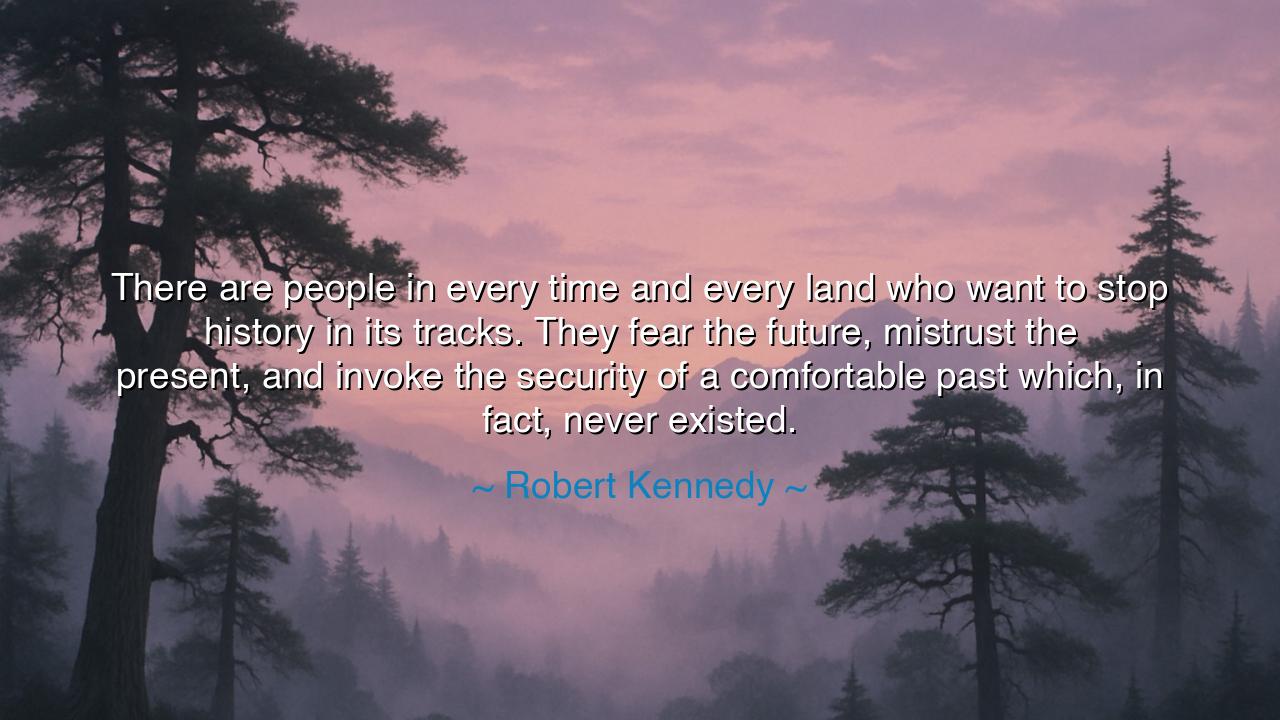
There are people in every time and every land who want to stop
There are people in every time and every land who want to stop history in its tracks. They fear the future, mistrust the present, and invoke the security of a comfortable past which, in fact, never existed.






In the powerful words of Robert Kennedy, "There are people in every time and every land who want to stop history in its tracks. They fear the future, mistrust the present, and invoke the security of a comfortable past which, in fact, never existed," we hear the timeless clash between progress and nostalgia. Kennedy speaks to a common human inclination to resist the inevitable march of time, to seek refuge in an idealized version of the past—a version often fabricated in the mind, disconnected from the truth of what once was. These individuals, whether in ancient times or today, are afraid of change, mistrustful of the present moment, and unwilling to embrace the future, for fear that it will upend their carefully constructed reality.
This resistance to history’s movement is as ancient as civilization itself. The ancient Greeks, with their profound understanding of the human soul, recognized that progress was often met with resistance. Plato, in his work "The Republic," warned against the temptation to cling to the past at the expense of growth. For Plato, the ideal society could not stand still in time; it had to evolve in accordance with the pursuit of truth and justice. The past, while valuable in its lessons, could not offer the answers for every age, nor could it safeguard a society from the challenges of its present or future. Those who refuse to adapt and embrace change risk becoming trapped in outdated beliefs and practices, forever bound by what was, rather than what could be.
Take, for example, the reign of Alexander the Great. His conquest of the known world was not simply about military might, but about reshaping the world according to a new vision. Alexander’s vision of a unified world, blending Eastern and Western cultures, was revolutionary in its time. Yet, his critics saw in his visionary ambitions a threat to the old ways—the traditions and systems that had long been held dear by those in power. They feared that his actions would disrupt the stability of the familiar world, clinging instead to a comfortable and idealized past that no longer served the needs of a changing world. Yet Alexander, in his pursuit of greatness, saw that progress was not to be feared. He understood that history cannot be stopped, for it flows relentlessly forward, and those who fear the future risk being swept away by its tides.
This theme resonates with the story of the Roman Empire, which, in its later years, faced tremendous resistance to change from those who longed for a return to the so-called glory days of the republic. The empire, burdened by corruption and inefficiency, was still revered by many who believed that its past greatness could somehow be restored. Yet, history teaches us that when we cling too tightly to what once was, we hinder the transformation that is needed for survival. The fall of Rome was not just the result of external invasions, but of an internal refusal to adapt and embrace the new realities of the world. The empire's leaders feared the future, clung to their past, and, in doing so, sealed their own downfall.
Kennedy’s words also speak to the perennial human tendency to seek the safety of a past that was, in truth, never as perfect as we remember it. This is a fallacy rooted in nostalgia, a longing for a time when things felt simpler, clearer, or more secure. But as history unfolds, we see that the past is never as idyllic as we imagine it to be. The Golden Age of any society is often an illusion, a moment in time when societal pressures and inequities were swept aside or ignored. In truth, the past was often marked by struggle and hardship, though these moments are conveniently forgotten by those who long for a return to a mythical time. Those who live in the illusion of a perfect past are blind to the complexities of the present and future.
The lesson embedded in Kennedy’s quote is clear: the future must be faced with courage, not fear. The present must be embraced with all its challenges and imperfections. The past should be respected for the lessons it offers, but it must not be idolized to the point of hindering progress. Just as the ancients recognized the need for balance between wisdom from the past and action in the present, we too must learn to navigate the tension between preserving tradition and embracing innovation. To fear change is to risk becoming irrelevant in a world that moves forward, relentlessly shaped by the forces of time.
In practical terms, we must reflect on our own relationship with history. Do we look back in longing for a time that never truly existed, or do we look forward, ready to face the challenges of the future with clarity and purpose? The key to building a better future lies in the ability to accept the present as it is, with all its complexities and uncertainties, and to approach the future with the wisdom and courage that come from understanding the lessons of the past. We must adapt, as the ancients did, and never be afraid to move forward, for history will continue whether we choose to acknowledge it or not. Let us be those who embrace the flow of time, fearless in the face of change and always ready to shape a new tomorrow.






AAdministratorAdministrator
Welcome, honored guests. Please leave a comment, we will respond soon